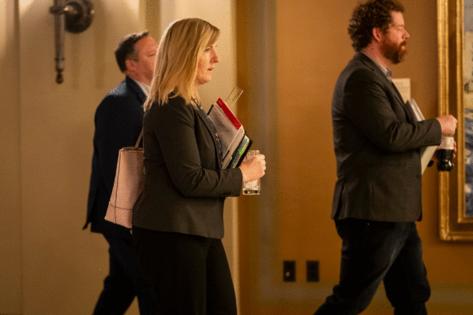Minnesota legislators enter final week of session without a budget deal. Here's where things stand
Published in News & Features
Minnesota legislators are heading into the final week of their session without an agreement on how much to spend over the next two years.
That spending framework is critical for the tied House and DFL-controlled Senate to begin reconciling differences and merging their respective budget bills. Gov. Tim Walz and legislative leaders have blown past their self-imposed May 2 deadline to come to an agreement, even after 10 straight days of negotiations that sometimes stretch late into the evening.
Several major sticking points have yet to be resolved before the Legislature’s May 19 adjournment deadline. Each day that passes without a deal brings lawmakers closer to needing a special session to finish the work for the first time in four years.
Here’s a look at where things stand heading into the final week of session:
The top order of business is the state budget.
Lawmakers must pass a new two-year budget before July 1 to avoid a government shutdown.
Minnesota is facing a bleak outlook due mostly to skyrocketing costs of long-term care for people with disabilities and special education for students. Walz and legislators are trying to pass a budget that heads off a possible multibillion-dollar deficit in the future.
The state’s next two-year budget is expected to total about $66 billion.
The standoff also extends to the state’s essential infrastructure projects.
Lawmakers didn’t pass legislation to authorize bonding last year. Now, they’re in agreement that the state needs to invest in its roads and bridges, repair dams, and clean up its drinking water. But with the looming deficit, they’re in stark disagreement over how much to spend.
The House GOP and DFL have agreed to a $700 million bonding target.
Sen. Sandy Pappas, a Democrat who chairs the Senate Capital Investment Committee, is urging fellow lawmakers to authorize almost twice that much. In a hearing Thursday to go over a $1.35 billion suite of potential projects, Pappas warned it would be difficult for lawmakers to pass a bonding bill two years in a row. She said the state should invest now rather than trying to pass smaller bonding packages this year and next.
“I just don’t know what will happen with interest rates; that’s another concern,” Pappas said. “Construction costs are constantly going up. And the fact that we didn’t do one last year — there’s just a lot of need out there."
Sen. Karin Housley, the ranking Republican on the committee, emphasized that $1.35 billion is the Senate DFL’s proposal. The GOP, she said, wants to stick to $700 million.
“Being that we have a $6 billion deficit staring us in the face,” she said, “I think the lesser amount that we can borrow is better for the state finances.”
Walz and legislative leaders are debating several sticking points, including whether to raise taxes and tweak policies passed by Democrats two years ago.
Republicans in the Minnesota House have been adamant they will not agree to tax increases. Senate Democrats have pitched a new tax on social media companies, and Walz has proposed lowering the sales tax rate while also expanding it to cover some previously excluded services.
GOP lawmakers are also pushing to roll back or revise some signature laws passed by Democrats in 2023. They want to repeal new programs providing summer unemployment insurance to hourly school workers and health care to undocumented immigrants, citing cost concerns.
Democrats have defended those programs. Members of the Minnesota House People of Color and Indigenous (POCI) Caucus held a news conference Thursday calling for the programs to be preserved.
“Protecting these achievements is not optional, it’s essential,” said Rep. Cedrick Frazier, DFL-New Hope.
Walz has expressed openness to tweaking the law allowing undocumented immigrants to enroll in MinnesotaCare, a state-funded health care program that covers low-income residents. He said Thursday his “red line” is that the program must still cover children.
“It just makes sense that they get their child the vaccinations, they get their checkups,” Walz said.
Some lawmakers have also proposed changes that would exempt certain small businesses from the state’s new paid family and medical leave and sick and safe time laws. It’s unclear if changes to the paid family and medical leave program will make it across the finish line.
Last week, all but one Senate Republican voted to exempt some small businesses and farms from the law requiring employers to offer sick and safe time. Six DFL senators joined them.
“If the Legislature can offer some help to our smallest of businesses,” said Sen. Judy Seeberger, DFL-Afton, “I think we should.”
Legislators are racing the clock.
The Legislature hasn’t needed a special session to get its work done since 2021, when lawmakers took extra time to pass a state budget and address the governor’s extension of a COVID-19 peacetime emergency declaration.
Before the pandemic, special sessions were pretty much the norm. Lawmakers needed special sessions in 2019, 2017, 2015 and 2011 to pass budget bills.
Legislative leaders had publicly expressed confidence in their ability to pass a budget on time until recently, when GOP Speaker Lisa Demuth preliminarily cast blame on House Democrats for a possible late finish because they boycotted the first few weeks of the session.
“If we even go a day over, it is because of a 23-day shutdown by Democrats,” said Demuth, R-Cold Spring.
Walz and legislative leaders continued discussions over the weekend at the Governor’s Fishing Opener in Crosslake. Beforehand, the governor said he was confident there could be some “walleye diplomacy.”
“It is getting late, that is an acknowledgment,” Walz said Thursday. “But I think that there is a commitment to getting this thing done on time, a commitment to balancing the budget.”
_____
(Janet Moore of the Minnesota Star Tribune contributed to this story.)
_____
©2025 The Minnesota Star Tribune. Visit startribune.com. Distributed by Tribune Content Agency, LLC







Comments